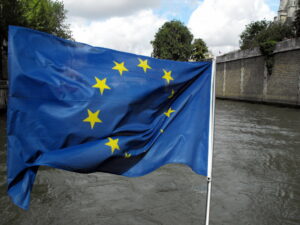Nestled down an arcade on Leeds’ busy Briggate is EcoTopia, a zero-waste store opened in October to capitalise on the growing awareness of what damage plastic is doing to the environment.
The shop is owned by twin sisters, Michelle Arthur and Samantha Newton, and sells everything from dishwasher tablets to cat litter to cocoa powder. Just bring in your own container, weigh how much you want and pay for it.
It’s a refreshing DIY ethos that has been central to why EcoTopia exists in the first place.
‘Instead of waiting for someone else to open a zero-waste shop in Leeds, my sister said to me “Let’s do it!” remembers Michelle, who said she stayed up for two nights, going through the aisles of Tesco in her mind, thinking of what plastic-free items they could stock.
It’s not just the people of Leeds they are serving either, the two mums are thinking ahead to what sort of world their children will inherit.
‘We both have kids and worry for their future.’
Gap in the market
Growing up in a normal household in York in the ’80s and ’90s, recycling wasn’t really on the agenda.
‘It’s how we were raised,’ says Michelle.
‘If there was stuff wrapped in plastic – put it in the bin! A lot of people were raised that way.’
Then Michelle worked in retail, ‘basically everything I now stand against’, and was shocked at the amount of waste generated.
But after noticing how the Blue Planet effect has captured the imaginations of shoppers, she started researching on social media and found a supportive community online who gave advice and answered questions she had about what she calls the ‘zero waste life’.
After spotting the gap in the market for a zero waste shop in Leeds, the sisters secured a loan from the Start-Up Loans Company to set up their venture, and have been welcoming sustainably-minded shoppers to their store for the past four months.
They are not alone in the UK, either, with similarly eco-minded stores sprouting up in towns and cities across the country that offer much more than the standard selection of grains or nuts in eco stores gone by. Environment Journal recently interviewed Paul and Cat Moffat of Cut the Wrap in Cumbria, as well as Lovacore in Glasgow, who are both proving that zero-waste is now a sustainable trend that can not only do its bit for the environment but make money too.
Break the chains
‘The big supermarket’s don’t listen,’ says Michelle.
It’s a fair criticism, too.
Step into your local Aldi or Tesco and you will still find fruit and veg bandaged in clear plastic wrapping over two years on since The Blue Planet first aired, despite a constant stream of complaints from customers and various ‘plastic pledges’ to tackle the issue.
‘They don’t seem to have changed,’ she adds.
‘Morrisons were trialling gravity dispensers for food, but they only had it in one or two stores.’
So Michelle decided that Eco Topia would give power to the people, and each month they have a voting board where customers can add suggestions whilst others vote for which item they’d like to see stocked.
Past winners include dried tomatoes, puy lentils and dishwasher tablets.
‘We take customer suggestions quite heavily,’ says Michelle.
During my visit, a customer gives the board a forensic going over.
‘Redbush tea is not making it is it!?,’ they sigh.
Also in the store is a TerraCycle collection point, a recycling scheme funded by large brands where you can drop off hard-to-recycle plastic waste such as crisp packets, snack/biscuit wrappers, pet food packets and oral care products.
Michelle hopes its the start of companies taking some responsibility for the waste that they produce.
EcoTopia sells crisps in fully compostable packets from the Herefordshire-based Two Farmers company, and Michelle bemoans the fact that the larger companies, with all their resources behind them, are so innovation-averse.
‘Walkers have an example now,’ she says.
‘They are perfectly good crisp packets. Why don’t they do it that way instead and they don’t even have to recycle?’
In December, Environment Secretary Michael Gove announced that the government would be introducing an Extended Producer Responsibility (EPR) scheme for businesses and manufacturers of packaging, who will be expected to pay the full cost of recycling or disposing of their waste, which the government estimates will raise up to a £1bn a year for recycling and disposal.
‘It comes down to money. Plastic is cheaper because it’s a byproduct and they want to make loads of money.’
Reasons to be cheerful
EcoTopia has recently set up a crowdfunder that could see several exciting innovations brought into the store including liquid dispensers for milk and dairy, gravity dispensers for dry products and a nut butter machine.
Michelle is optimistic for the future of her shop, but is she optimistic for what sort of state of the planet will be in when her children grow up?
‘I have days when I think it will be all fine then I have days where I feel guilty about bringing them into this world!’
‘They say the best thing to do to reduce your carbon footprint is not to have kids! I can’t put them back though can I? So I have to do my best to teach them the best I can, so they don’t impact the world too negatively.’
After leaving EcoTopia into the balmy February sunshine I come across the hundreds of #YouthStrike4Climate protestors outside Leeds Town Hall, striking from school and waving banners with anti-plastic messages and chanting slogans about saving the seas, so perhaps Michelle and EcoTopia have reasons to be optimistic after all.













